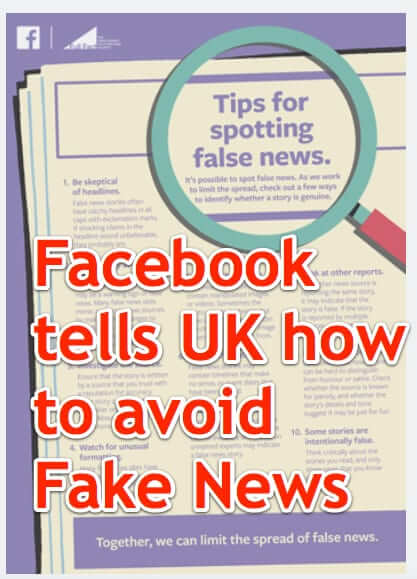Tag: advertisement
Facebook Runs Newspaper Ad in UK Telling People How to Spot Fake News (Full Text of Advertisement Here)
Facebook has taken out a full-page “Tips for Spotting False News” ad in British newspapers, telling people how to spot and avoid fake news ahead of the UK general election. Facebook has also been deleting tens of thousands of fake Facebook accounts that were created solely to spew false news stories, particularly ahead of elections. In fact, Facebook has said that ahead of this week’s election in France, they removed more than 30,000 accounts that were spreading fake news stories that could have (and were likely intended to) influence that election.
Internet Censures Country’s Most Tasteless 9/11 Advertisement
If they are to be believed, Tumbledown Trails golf course was trying to do the right thing when they offered a special 9/11 discount to their golf course in Verona, Wisconsin. But, they clearly went about it in the wrong way, and the wrath they incurred has apparenty led to their taking their Facebook page down.
Facebook Sued Over Featuring Users in Advertisements
You knew that Facebook uses you in their advertising, right? Those sidebar advertisements (so called “sponsored stories”) where you often see your friends featured – “So and so likes this advertiser” – they do that with your likeness too. We have often ranted about it – now someone is doing something about it: In the case of Fraley v. Facebook plaintiff Fraley and others are suing Facebook in a class action suit, and the Federal court has approved Fraley versus Facebook moving forward. U.S. District Judge Lucy Koh agreed that there was a chance that the plaintiffs could win their case based on claims that Facebook has committed fraud, and violated California law with unauthorized use of their image and name, in using Facebook friends’ images and names in advertising displayed in the Facebook sidebar.
Post Office Advertisement Says Snail Mail Safer Than Email
The United States Postal Service (USPS) is in deep financial trouble, in large part due to the advent of email, and online bill paying and other services. Now, in what can only be described as the Post Office taking a page from election year partisan smear campaigns, the USPS is attacking the Internet as dangerous and unreliable, and touting postal mail as safe and good for business. “A refrigerator has never been hacked,” starts the television advertisement, which is primarily aimed at businesses.
Slashdot Adds Ads to its RSS Feeds
Imagine our surprise today when, while checking out Slashdot’s RSS feeds (or, as those in the biz like to call it, /. ) we noted a full-colour advertisement exhorting us to check our credit score, and another for Tek Systems. In fact, there is now an advertisement along with every story summary in the Slashdot RSS feed – ads for penny stocks, even ads for Google Chrome.
New FTC Rules on Bloggers Blogging and Internet Marketers Marketing Testimonials and Endorsements Explained
The Federal Trade Commission (FTC) today published its updated rules governing the publication of endorsements and testimonials by “consumers, experts, organizations, and celebrities” (in other words, everybody). The updated rules governing online testimonials and endorsements arguably now cover bloggers, Internet marketers, affiliates, and others who promote (including through endorsing or testimonial) products or services on the Internet. The bottom line is, if you talk about a product or service, and if you put it out on or via the Internet, and if you stand to gain on it, you’d better disclose that relationship.




